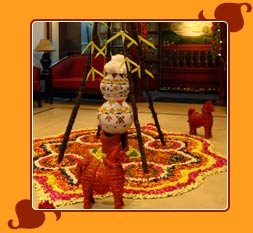Pongal is a four-days-long harvest
festival celebrated in Tamil Nadu, a southern state of India. For as long as
people have been planting and gathering food, there has been some form of
harvest festival. Pongal, one of the most important popular Hindu festivals
of the year.

This
four-day festival of thanksgiving to nature takes its name from the Tamil
word meaning "to boil" and is held in the month of Thai
(January-February) during the season when rice and other cereals,
sugar-cane, and turmeric (an essential ingredient in Tamil cooking) are
harvested. Mid-January is an important time in the Tamil calendar.
The
harvest festival, Pongal, falls typically on the 14th or the 15th of January
and is the quintessential 'Tamil Festival'. Pongal is a harvest festival, a
traditional occasion for giving thanks to nature, for celebrating the life
cycles that give us grain. Tamilians say 'Thai pirandhaal vazhi pirakkum',
and believe that knotty family problems will be solved with the advent of
the Tamil month Thai that begins on Pongal day. This is traditionally the
month of weddings. This is not a surprise in a largely agricultural
community - the riches gained from a good harvest form the economic basis
for expensive family occasions like weddings.
Pongal
Celebrations The First Day - Bhogi Pongal The
first day od pongal is celebrated as the Bhogi Pongal and is usually meant
for domestic activities and of being together with the family members. This
first day is celebrated in honour of Lord Indra, the supreme ruler of clouds
that give rains. Another ritual observed on this day is Bhogi Mantalu, when
useless household articles are thrown into a fire made of wood and cow-dung
cakes. Girls dance around the bonfire, singing songs in praise of the gods,
the spring and the harvest.
The Second Day - Surya
Pongal The second day of harvest festival is known as 'Pongal', in
tamionadu, the most important day of the entire festival, where prayers are
offered to the Sun. On this day, the Sun is given great importance. On the
morning of this day, the family will gather outside their houses and cook
'pongal' in clay pots. When the rice inside the pot overflows, the people
will cry out 'Pongal O Pongal' and pray to the Sun. The overflow of rice
symbolizes a prosperous farming season for them. On this auspicious day,
people will visit each other and dine. Sweets are also cooked in the Hindus
homes for the guests.
The Third Day - Mattu PongalThe
third day is known as Mattu Pongal, the day of Pongal for cows. To the
village people cow, the giver of milk and the bull which draws the plough in
the fields are very valuable and therefore the farmers honour their dumb
friends by celebrating it as a day of thanks-giving to them. The cattle are
washed, their horns are painted and covered with shining metal caps.
The
Fourth Day - Kaanum PongalKanu Pongal, which falls on the same day
as Maatu Pongal, is celebrated by sisters for the welfare of their brothers.
Pongal or Harvest festival of Tamilnadu is reminiscent of Raksha Bandhan and
Bhai Dooj of North India.
Pongal KolamsWhen
it's the time for Pongal festivity celebration, almost all the houses in the
entire South India are adorned with beautiful colorful Kolams. Elaborate
designs are drawn using white and other color powders. The tradition of
Kolam making is not new. Infact, it can be traced back to the times of the
Indus Valley Civilization (2500 B.C).






 This
four-day festival of thanksgiving to nature takes its name from the Tamil
word meaning "to boil" and is held in the month of Thai
(January-February) during the season when rice and other cereals,
sugar-cane, and turmeric (an essential ingredient in Tamil cooking) are
harvested. Mid-January is an important time in the Tamil calendar.
This
four-day festival of thanksgiving to nature takes its name from the Tamil
word meaning "to boil" and is held in the month of Thai
(January-February) during the season when rice and other cereals,
sugar-cane, and turmeric (an essential ingredient in Tamil cooking) are
harvested. Mid-January is an important time in the Tamil calendar.